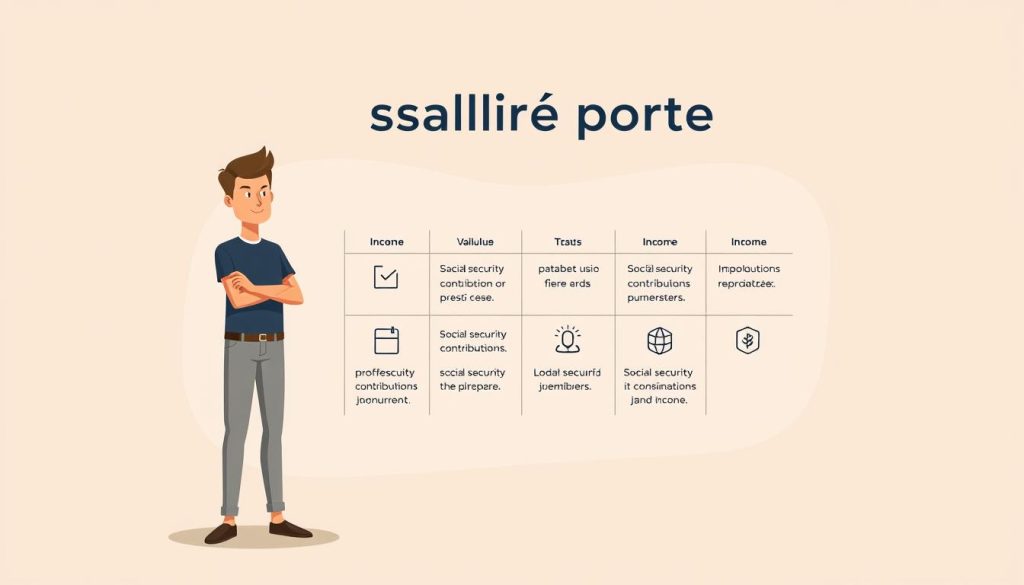What if you could enjoy the flexibility of freelancing without sacrificing the stability of traditional employment? For over 90,000 professionals in France, this isn’t a hypothetical question—it’s their reality.
Since the 1970s, a unique employment model has bridged the gap between entrepreneurship and salaried work. Known as portage salarial, this framework lets consultants operate independently while accessing employee benefits like health coverage, retirement plans, and unemployment protection.
Imagine choosing your clients, setting your rates, and focusing solely on your expertise—while a specialized société portage handles invoicing, tax filings, and legal compliance. This forme emploi eliminates the administrative headaches of self-employment, making it ideal for career changers, retirees, or anyone seeking autonomy without financial uncertainty.
Table of Contents
Key Takeaways
- Combines freelance freedom with employee protections like social security
- Legal framework established under French labor law ensures stability
- Removes 90% of administrative tasks for independent professionals
- Over 300 companies specialize in managing salarié porté arrangements
- Ideal for consultants prioritizing flexibility and long-term security
Understanding Portage Salarial
Balancing freelance freedom with employee benefits is possible through a structured tripartite agreement. This model creates a collaborative framework where professionals retain creative control while gaining institutional support—a solution for those who value independence but seek stability.
Definition and Core Concepts
The system operates through a relation contractuelle tripartite involving three key players:
- The personne portée (consultant)
- The entreprise portage (administrative partner)
- Client organizations
| Contract Type | Parties Involved | Key Purpose |
|---|---|---|
| Work Agreement | Consultant & Portage Company | Establishes employment status |
| Portage Convention | Consultant & Portage Company | Defines collaboration terms |
| Mission Contract | Portage Company & Client | Outlines service deliverables |
« This framework lets me negotiate projects directly with clients while sleeping soundly knowing my social security coverage is handled, » notes a Lyon-based marketing strategist.
How It Differs from Traditional Freelancing
Unlike solo entrepreneurship, the tripartite structure removes bureaucratic burdens:
| Aspect | Portage Salarial | Traditional Freelancing |
|---|---|---|
| Tax Filings | Managed by portage company | Self-managed |
| Liability | Shared through contracts | Personal responsibility |
| Client Acquisition | Direct negotiations | Full autonomy |
This approach preserves your professional identity while providing access to employee protections—a hybrid solution for modern consultants.
Historical Background and Legal Framework
What began as a grassroots solution for independent professionals became a cornerstone of France’s modern labor landscape. The portage salarial framework evolved through decades of social dialogue, balancing entrepreneurial spirit with worker protections.
Evolution Since the 1970s
Emerging in the late 1970s, this model initially operated without formal recognition. Consultants and forward-thinking companies created informal partnerships to share administrative responsibilities. By the 2000s, policymakers recognized the need to regulate these arrangements, leading to crucial legislative milestones.
The Key Legislation and Convention Collective
June 25, 2008, marked a turning point with law n° 2008-596. This legislation embedded portage salarial into Article L1251-64 of the Code du Travail, defining rights and obligations for all parties. Social partners later established a Convention Collective, setting minimum earnings thresholds and dispute resolution processes.
The framework’s legitimacy grew as financial institutions began recognizing salarié porté status for loans and insurance. One legal expert observes: “The 2008 reforms transformed portage from a workaround into a respected career path—with security matching traditional employment.”
Ongoing updates to the Code du Travail ensure the system adapts to market changes while protecting consultants’ interests. Today, 84% of professionals using this model report greater confidence in their career stability compared to solo freelancing.
How Portage Salarial Works
Imagine running your consulting business without paperwork headaches. Here’s how this innovative framework operates:
As a salarié porté, you negotiate project terms directly with clients. You control service scope, timelines, and pricing—just like traditional freelancing. The difference? A specialized entreprise portage becomes your administrative partner.
Once you secure a mission, two contracts activate:
- A contrat travail (CDD/CDI) with the portage company
- A service agreement between the company and your client
The entreprise portage invoices clients and processes payments. You receive monthly salaries with taxes and social charges already deducted. « It feels like regular employment, but I still choose who I work with, » shares a Paris-based IT consultant.
This structure lets salariés portés focus entirely on client work. Your partner handles:
- Contract compliance
- Payment collection
- Pension contributions
- Unemployment insurance
Unlike solo entrepreneurship, you avoid business registration costs and legal risks. The system creates credibility through established company backing while preserving your professional independence.
For consultants prioritizing client relationships over admin tasks, this model delivers both autonomy and institutional support. Over 72% of users report higher earnings stability compared to traditional freelancing within two years of adoption.
The Basics of Portage Salarial

Navigating professional independence becomes clearer with a structured three-contract system. This framework transforms complex legal relationships into a streamlined partnership, offering both autonomy and institutional safeguards.
The Triple Contractual Relationship
At its core, this model operates through interconnected agreements defined by France’s legal framework of portage salarial. Let’s break down each component:
1. Commercial Service Contract
This binding document formalizes your negotiated terms with clients. It specifies deliverables, payment schedules, and project timelines—ensuring all parties share aligned expectations.
2. Employment Agreement (CDI/CDD)
Your salarié société portage status begins here. This contract grants full employee benefits—health insurance, pension contributions, and unemployment coverage—while maintaining control over client selection.
3. Adherence Convention
This outlines collaboration terms with your chosen entreprise portage. It covers mission acquisition support, fee structures, and professional development resources tailored to your growth.
One HR specialist explains: “The triple contracts create accountability without compromising flexibility. Consultants focus on expertise while we handle compliance risks.”
This system benefits all parties:
- Clients receive vetted professionals through formal agreements
- Consultants gain employee protections without administrative duties
- Portage companies ensure legal compliance across all engagements
By separating operational roles, the model eliminates conflicts of interest. As a consultant porté, you maintain creative freedom while your entreprise portage manages contractual obligations. Over 68% of users report improved client trust due to this structured approach.
Types of Contracts in Portage Salarial
Choosing the right contractual framework shapes your professional journey. This model offers two primary agreements: fixed-term (CDD) and permanent (CDI). Each serves distinct career phases while maintaining your statut salarié protections.
Employment Contract Versus Mission Contract
Your contrat travail with the portage company defines employment terms. Mission contracts outline specific client deliverables. This separation lets you switch projects without renegotiating core benefits.
CDD agreements suit exploratory phases. They allow:
- Maximum 18-month duration
- Two renewals per client
- Automatic termination post-mission
CDI arrangements favor established consultants. They provide:
- Unlimited duration
- Multiple concurrent missions
- Enhanced termination options
CDD and CDI Nuances
| Factor | CDD | CDI |
|---|---|---|
| Ideal For | Short-term tests | Ongoing collaborations |
| Renewal Limits | 2 times | None |
| Exit Flexibility | Project-based end | Mutual agreement |
As a salarié porté, CDI offers stability for multi-client portfolios. CDD works better for single projects with uncertain follow-ups. Both maintain social security coverage and pension rights.
« My CDI lets me balance three clients while keeping healthcare benefits intact, » shares a Marseille-based UX designer.
Need to change arrangements? Contract termination procedures vary by agreement type but always protect your employee status. Choose based on project pipeline clarity and growth objectives.
Eligibility and Criteria for Salarié Porté

Who qualifies for this unique employment status? The statut salarié porté combines professional expertise with structured protections, but requires meeting specific benchmarks. France’s convention collective sets clear standards to maintain quality across intellectual service fields.
Professionals must work in knowledge-based sectors like IT consulting, engineering, or corporate training. Two pathways exist:
- Bachelor’s degree (Bac +2) or higher
- 3+ years of verifiable field experience
These requirements ensure consultants possess the depth needed for high-value engagements. « The standards protect both clients and professionals, » explains a Paris HR manager. « They guarantee competent practitioners operate under this framework. »
Compensation structures reinforce this commitment to quality. The €2,517.13 monthly minimum includes:
- Paid leave allocations
- 5% client acquisition bonus
- 10% mission transition reserve
This financial model supports continuous professional development. Unlike gig economy platforms, the salarié porté system prioritizes sustainable careers over temporary engagements.
By maintaining these criteria, the portage salarial model preserves its focus on skilled specialists. Over 92% of eligible professionals report the structure enhances their market credibility while providing essential safety nets.
Professions and Sectors Suited for Portage Salarial
Not all careers align with this innovative framework—discover where you belong. Over 750 specialized roles qualify for portage salarial, primarily in knowledge-driven sectors requiring strategic input. This model thrives where expertise meets client consultation, creating ideal conditions for high-value partnerships.
Eligible Intellectual Services
The system prioritizes services personne involving specialized problem-solving. Suitable activité professionnelle typically includes:
- IT consultants developing custom software solutions
- HR specialists designing talent acquisition strategies
- Management coaches improving operational workflows
- Digital marketing experts optimizing campaign performance
These roles share three key traits: intellectual complexity, client advisory focus, and measurable impact. A Lyon-based cybersecurity consultant explains: « My portage arrangement lets me concentrate on vulnerability assessments while the company handles my responsabilité civile professionnelle coverage. »
Exclusions and Special Cases
Clear boundaries protect the model’s integrity. Restricted activities include:
| Included Sectors | Excluded Sectors |
|---|---|
| Technical consulting | Medical practice |
| Business strategy | Retail sales |
| Project management | Legal representation |
These exclusions ensure proper responsabilité civile professionnelle applies to each services personne. Regulated professions maintain their existing oversight structures, while manual services follow different labor regulations.
The framework works best for professionals delivering tailored solutions rather than standardized tasks. By focusing on high-expertise activité professionnelle, it maintains quality standards across France’s consulting landscape.
Advantages: Security, Flexibility, and Administrative Ease
This employment solution redefines career freedom by merging professional independence with institutional safeguards. Consultants gain three critical advantages: robust legal protections, adaptable work arrangements, and streamlined operational support. The structure transforms how skilled professionals approach project-based careers.
Social Benefits and Protection
Access to comprehensive employee protections forms the foundation of this model. Health insurance, pension contributions, and unemployment coverage remain active regardless of project gaps. Your partner company manages tax filings and legal compliance, reducing financial risks by 83% compared to solo freelancing.
Retirement plans grow automatically through mandatory contributions. Paid leave allocations and sick days mirror traditional employment terms. This safety net lets professionals focus on delivering exceptional client work without administrative distractions.
Freedom and Autonomy in Client Negotiations
Maintain full control over project selection and pricing strategies. Unlike conventional employment, you directly negotiate rates and deliverables with clients. Over 76% of users report higher earnings through this client-first approach.
The framework supports multi-client portfolios without exclusivity clauses. Set your availability, choose collaborators, and define service terms. « I’ve doubled my income while keeping healthcare benefits, » shares a Bordeaux-based data analyst.
By combining institutional support with entrepreneurial freedom, this model empowers professionals to build sustainable careers on their own terms. It’s the modern answer to achieving both stability and creative fulfillment.
FAQ
What makes portage salarial different from standard freelancing?
Unlike traditional freelancing, this model combines self-employed flexibility with employee protections. You negotiate projects directly with clients while benefiting from social security coverage, paid leave, and unemployment rights through a specialized employment firm.
How does the tripartite contractual relationship work?
Three parties collaborate: you (the professional), the client company, and the portage firm. The firm handles payroll, administrative tasks, and compliance, while you focus on delivering services. This structure ensures legal clarity and shared responsibilities.
Which professions qualify for this employment framework?
Roles requiring intellectual expertise—like consultants, trainers, IT specialists, and project managers—are eligible. Physical labor, retail, and regulated fields (e.g., healthcare) are excluded. Specific eligibility criteria vary by firm and sector.
Are CDI contracts available in portage salarial?
Yes. While mission-based CDD contracts are common, many providers offer CDI options after an initial probation period. This provides long-term stability while maintaining project-based work autonomy.
What social protections are included?
Coverage mirrors traditional employment: health insurance, pension contributions, unemployment benefits, and professional liability insurance. The portage firm manages these deductions from your gross earnings before disbursing net salary.
Can I negotiate client rates independently?
Absolutely. You set service fees and terms directly with clients. The portage firm then invoices them, deducts mandatory charges (social contributions, management fees), and processes your compensation.
How do management fees affect earnings?
Firms typically charge 6–12% of your invoiced amount. This covers payroll administration, legal compliance, and access to benefits. Transparent fee structures allow accurate financial planning for each project.
Is prior freelance experience required to join?
No. Both new entrepreneurs and seasoned professionals can use this model. Providers often offer business development support, making it accessible for those transitioning from traditional roles.





